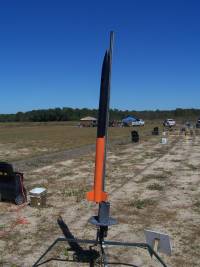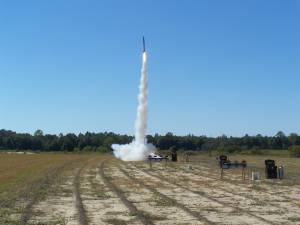Always Ready Rocketry Blue Tube 2.0
Always Ready Rocketry - Blue Tube 2.0 {Component}
Contributed by Cliff Oliver
| Published: | 2010-11-27 |
| Manufacturer: | Always Ready Rocketry  |
 This review is focused more on the Blue Tube 2.0 material than the rocket I built. The rocket was constructed pretty much like any other HPR rocket - with three 'glassed fins and an altimeter bay for the dual recovery system.
This review is focused more on the Blue Tube 2.0 material than the rocket I built. The rocket was constructed pretty much like any other HPR rocket - with three 'glassed fins and an altimeter bay for the dual recovery system.
I acquired the Blue Tube 2.0 items from Always Ready Rocketry. I had heard the good and the bad points of the original Blue Tube and wanted to find out how the 2.0 version performed. The body tube I received was a single 48-inch tube. I was pleased by this because, if you want to build a longer rocket, you don' t have to splice as many shorter tubes together to make up the length. Randy at Always Ready Rocketry advised me to use a sanding sealer on the airframe to seal it from moisture. So, I used some that I found at my local home improvement store. Following the instructions, I applied the sealer in smooth coats and sanded between each. After three cycles of applying and sanding, I measured the tube and made the cuts for the payload and booster sections, the one-inch band for the altimeter bay and two 1/4 inch bands for the interior stops for the altimeter bay bulkheads. I used my compound miter saw with a rough cut blade for this. If you use this method make sure you let the blade go through the material slowly. Otherwise, it will tend to burr the edges. I also used this method to cut the motor mount to the length I wanted.
The sanding sealer did a fair job of filling the deep spiral lines in the body tubes. I used spot filler putty to finish them. Remembering that one of the chief complaints about the original Blue Tube was warping when it got hot, I painted the upper payload section gloss black. To make a comparison, and to make it easier to see, I painted the booster section orange.
At the SEARS 572 October launch I purposely placed the rocket in the sun lying on its side in the grass. The weather that day was sunny and the temperature was in the low eighties. After several hours of this I checked for any warping. None was detected. The slip joint fit had not changed either.
I flew the rocket, which I named "Blue Tuber," on an Aerotech I211 motor to an altitude of about 2900 feet. The flight was straight and it suffered no damage.
I like the Blue Tube 2.0. It is very strong material that is not brittle like phenolic tubes. The changes that have been made seem to have corrected some, if not all, of the issues reported on the original Blue Tube. It is a little pricier than phenolic tubing. But, if you want a strong airframe, that does not need further reinforcement, I would suggest looking at Blue Tube 2.0.

 |
 |
Wayne Comfort (March 25, 2011)
I'm considering blue tube for my first HPR build. My plan is to buy the LOC Nuke Pro Max and replace the stock tube with blue tube. Does anybody have any experience cutting fin slots in blue tube? That would be my only concern with this product.
Rob Appleton (June 26, 2012)
To cut one of my tubes to length, I used a Dremel with cutting wheel, did an excellent job. This stuff is TOUGH and doesnt shatter or chip!
Sponsored Ads
 |
 |












Glen Nardin (January 20, 2011)
I haven't, yet, launched my 5", but I cut it with a razor saw. Just wrapped a one inch strip of file folder around the tube and taped it in place. Came out super smooth.